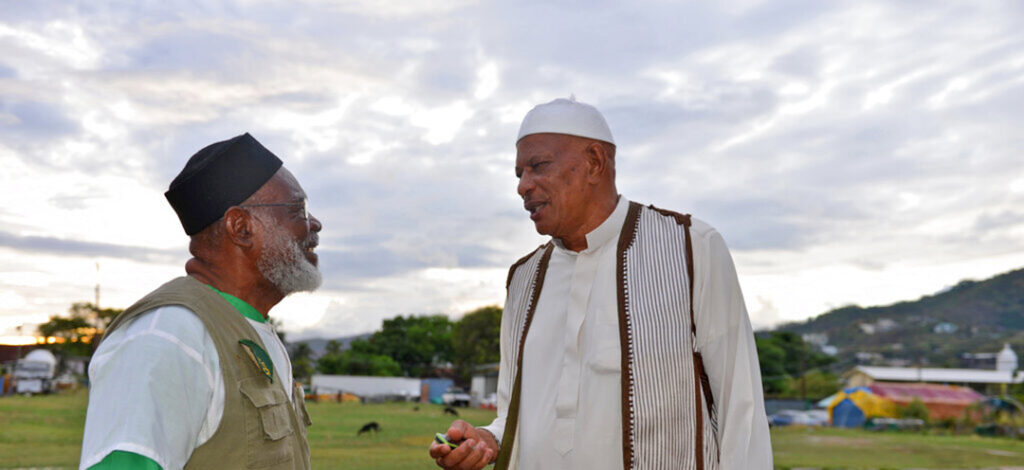Yasin Abu Bakr, right, led a small army that stormed Trinidad and Tobago’s Parliament in 1990. He is shown here speaking with a fellow member of his group, Jamaat al Muslimeen, at their compound in Trinidad. Bakr, who was never convicted of any charges, died in October 2021. THE ASSOCIATED PRESS
DR. SANJAY BADRI-MAHARAJ
Trinidad has become the epicenter of radical jihadi sentiment in the Caribbean, some of which has found expression in violent criminal gangs. A group called the Jamaat al Muslimeen began in the 1980s as a small criminal organization. It obtained funding, training and weapons from Libya, and began to recruit from other radical elements in mosques. With weapons and funding (routed through Muammar al-Qaddafi’s World Islamic Call Society), the Jamaat al Muslimeen appealed to a growing number of recent Afro-Trinidadian converts to Islam, who saw themselves as distinct from the traditional and largely moderate Indo-Trinidadian Muslim population.
The Jamaat al Muslimeen, led by a former police officer and convert to Islam, the late Yasin Abu Bakr (born Lennox Philip) staged a coup on July 27, 1990, and held Prime Minister Arthur N.R. Robinson, most of his Cabinet and many parliamentarians hostage. The country’s Parliament, television station and a key radio station were seized; uncontrolled looting and arson left 24 dead, 231 wounded and extensive damage. To negotiate an end to the violence, the government granted amnesty for the insurrectionists. This was given under duress, but it was subsequently upheld by Trinidad’s courts, and the members of the Jamaat al Muslimeen escaped any consequences for their actions.
The insurrection and its aftermath revealed the depth of government vulnerability, including underestimating the threat, failing to organize an effective response and then failing to punish the insurrectionists. The latter failure gave the Jamaat al Muslimeen an aura of invincibility. Emboldened, they went on to spawn a series of groups, including the Jamaat al Islami al Karibi, the Waajihatul Islaamiyyah (The Islamic Front, which is openly supportive of al-Qaida) and the Jamaat al Murabiteen, each drawing their leadership from former members of the Jamaat al Muslimeen.
The next stage in the development of jihadist ideology in Trinidad came with the emergence of the Islamic State Group (IS), which was the first terrorist group to use social media effectively. In Trinidad, their messages were rapidly disseminated through social media and websites, supplemented by direct recruitment through proxies and allied groups. The affiliates, spin-offs and associates of Jamaat al Muslimeen, with their networks among Trinidad’s cities, mosques and economically disadvantaged urban neighborhoods, were ideally placed to act as fronts for IS or other Jihadi recruiting efforts in Trinidad. As a result, IS recruited more foreign fighters per capita from Trinidad and Tobago than from any other country in the Americas.
Trinidad has a population of just over 1.3 million, with 35.4% of the population of Indian origin, 34.2% of African descent and 22.8% being of mixed parentage. In terms of religion, 57% of the population identifies as Christian, 18% as Hindu, 13% as atheist, and just 5% as Muslim. There are Sunni and Shia Muslims in Trinidad, but the more significant division is between traditional Muslims of Indian origin and the more recent group of Afro-Trinidadian converts, as the majority of the violent radicals came initially from the latter group. However, even the more affluent, well-integrated Indo-Trinidadian Muslim population has been penetrated by radical doctrines, which is why IS was able to recruit from all sections of the community.
Trinidad’s extremist groups have forged links with other groups within the region. In 2007, Trinidadian Kareem Ibrahim was among a group of four, including three Guyanese, implicated in a plot to attack John F. Kennedy International Airport in New York. Of these, Guyanese nationals Russell Defrietas and Abdul Kadir approached the Jamaat al Muslimeen for assistance and financial backing. Another Guyanese national, Abdel Nur, was extradited from Trinidad to the United States along with Ibrahim and Kadir. Ibrahim, Kadir and Defrietas were found guilty and sentenced to life in prison, while Nur pled guilty and received a 15-year prison sentence.
More worrying is the nexus between criminal gangs and radical Islamist ideology with a Trinidadian gang calling itself Unruly ISIS. While the Jamaat al Muslimeen and some of its offshoots were major criminal forces in their own right, these new Islamist-inspired criminal gangs pose a major challenge.
This has security implications for the U.S. and other nations. Trinidad allows for easy transit through the U.S. and United Kingdom, and there is free movement within the Caribbean region, which means Trinidad could export its relatively successful model of radical jihad. The rise of crime and radical Islam that happened in Trinidad could be replicated in other Caribbean countries, particularly those already contending with social challenges. Countries such as Guyana and Suriname could potentially be at risk of contagion. The further spread of gangster jihad would present a significant challenge to both regional and U.S. homeland security.
Dr. Sanjay Badri-Maharaj is an attorney and consultant to the Trinidad and Tobago Ministry of National Security and a member of the Trinidad and Tobago Defence Force Commissions Board.
The Watch is a professional military journal published by U.S. Northern Command to provide an international forum for military personnel and academics involved in homeland defense. The opinions expressed in this piece do not necessarily represent the policies or points of view of the command or any other agency of the U.S. government.

